Metafort G 853 Tablet
$30.00 – $60.00Price range: $30.00 through $60.00
| Pack Size | Price | Price / Unit | Quantity | |
|---|---|---|---|---|
| 300 Tablets | $60.00 | $0.20/ unit | ||
| 200 Tablets | $50.00 | $0.25/ unit | ||
| 100 Tablets | $30.00 | $0.30/ unit |
Want to order in bulk / B2B price ? | Send Inquiry |


| SKU | 11204 |
| Manufacturer | Eris Lifesciences Ltd |
| Categories | Diabetes |
| Delivery Time | 10 - 14 Working Days |
| Strength | 853mg |
Introduction to Metafort G 853 Tablet
Metafort G 853 tablets are a combination medication used primarily in the management of type 2 diabetes. The tablet contains two active ingredients: Metformin and Glimepiride. Metformin is a biguanide that works by decreasing glucose production in the liver and enhancing insulin sensitivity in the body, which helps lower blood sugar levels. Glimepiride, on the other hand, is a sulfonylurea that stimulates the pancreas to release more insulin, further aiding in blood sugar control.
Together, these components provide a dual mechanism of action to effectively manage blood glucose levels in individuals with type 2 diabetes. Metafort G 853 is often prescribed when diet, exercise, and other medications alone have not achieved sufficient glycemic control. The combination helps improve overall blood sugar regulation, reduce hemoglobin A1c levels, and potentially decrease the risk of diabetes-related complications.
Uses of Metafort G 853
- Management of Type 2 Diabetes Mellitus
- Reduction of Blood Sugar Levels
- Improvement of Glycemic Control
How Does Metafort G 853 Works?
Metafort G 853 controls blood glucose levels, where glimepiride works by increasing the amount of insulin released by the pancreas in order to lower the blood glucose. Metformin works by lowering glucose production in the liver, delaying glucose absorption from intestine, and increasing the body’s sensitivity to insulin.
Side Effects of Metafort G 853
Common Side Effects
- Taste disturbance
- Nausea
- Diarrhea
- Vomiting
- Stomach pain
- Loss of appetite
Rare Side Effects
- Severe Hypoglycemia
- Allergic Reactions
- Severe Skin Reactions
- Signs of Heart Failure
How to Manage Side Effects?
- Contact your healthcare provider
- Follow prescribed dosage
- Take with food
- Stay hydrated
- Avoid alcohol and certain substances
- Monitor your symptoms
Dosages of Metafort G 853 Tablets
Warnings & Precautions
1. Not for Type 1 Diabetes or Diabetic Ketoacidosis:
- This medicine is only for type 2 diabetes patients.
2. Risk of Low Blood Sugar (Hypoglycemia):
- Glimepiride can cause low blood sugar—watch for symptoms like sweating, shakiness, dizziness, or confusion.
3. Surgery or X-rays with Contrast Dye:
- Tell your doctor beforehand; Metformin may need to be stopped temporarily.
4. Pregnancy and Breastfeeding:
- Consult your doctor before use if pregnant or breastfeeding.
5. Dehydration and Illness:
- Avoid dehydration (vomiting, diarrhea) as it increases side effect risks.
Storage
- Store at room temperature, ideally between 15°C to 30°C (59°F to 86°F).
- Keep the medicine in a dry place, away from moisture and humidity.
- Protect from direct sunlight and heat.
- Do not refrigerate or freeze the tablets.
- Keep the tablets in their original packaging until use.
- Store out of reach of children and pets.
- Do not use the medicine after the expiry date printed on the pack.
Frequently Asked Questions
1. How long will I need to take this medicine?
Ans. Usually, it is a long-term treatment to manage your blood sugar levels.
2. Can I drive or handle machines after taking Metafort G 853?
Ans. Do not drive or handle any machines if you experience low or high blood sugar levels (symptoms include dizziness, tiredness, shaking or trembling) or if you develop visual problems due to altered blood sugar levels. Consult your doctor before taking Metafort.
3. Can I consume alcohol while taking Metafort G 853?
Ans. Avoid consumption of alcohol during treatment with Metafort as it may increase or decrease the blood sugar lowering action of Metafort and increases the risk of lactic acidosis. Consult your doctor for advice before taking Metafort.
4. Is Metafort G 853 safe to use in patients with kidney problems?
Ans. Metafort is not recommended for use in patients with severe kidney disease and it should be used with caution in patients with kidney disease and your dose will be adjusted if needed depending upon kidney function. Consult your doctor before taking Metafort.
| Pack Size | 100 Tablets, 200 Tablets, 300 Tablets |
|---|---|
| Price/Unit | $0.20/unit, $0.25/unit, $0.30/unit |
3 reviews for Metafort G 853 Tablet
Add a review Cancel reply
Related Products
No related Products Found



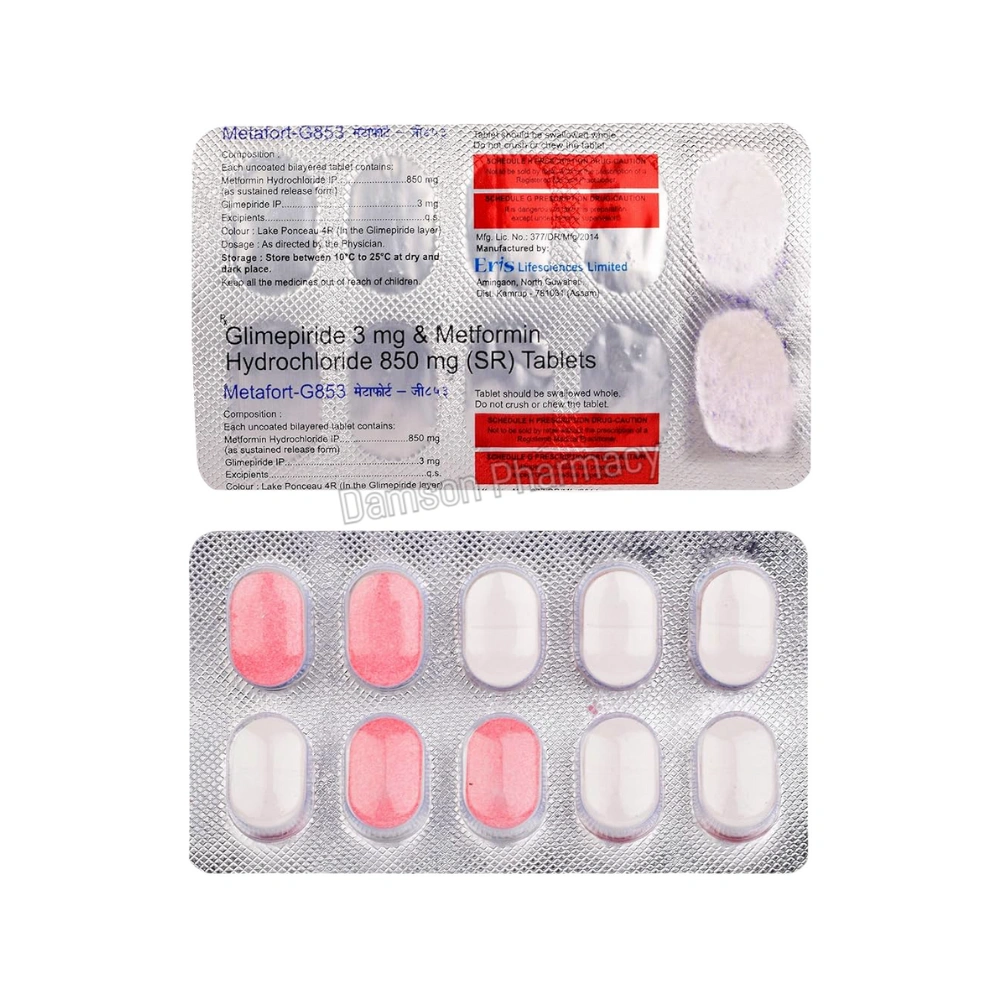
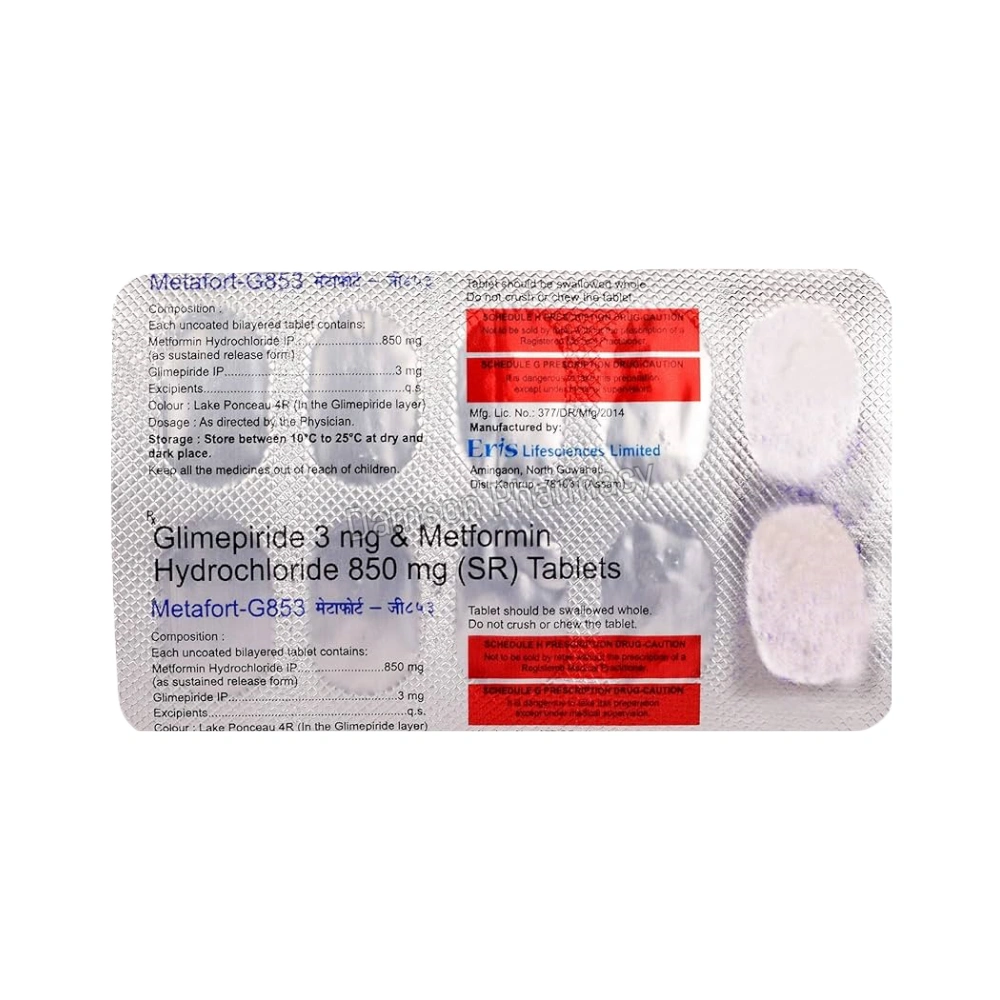


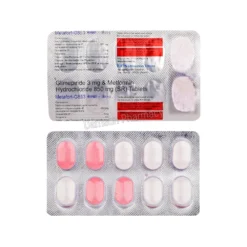
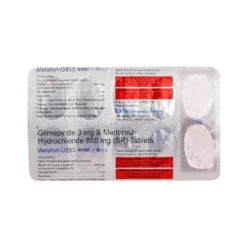
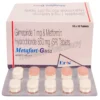
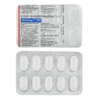
Fisher –
Always happy to use the Damson pharmacy, delivery is quick and the parcel arrives well packed ,so I go back time after time.
Xeno –
I’m very satisified with Damson Pharmacy
Wade –
Very good experience with Damson Pharmacy